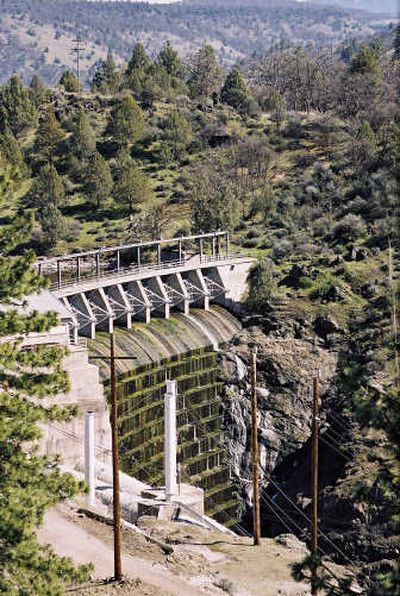FERC OKs Klamath dams

GRANTS PASS, Ore. – Federal licensing authorities Friday recommended keeping PacifiCorp’s four hydroelectric dams on the Klamath River, siding with the utility and ignoring calls from fisheries agencies to build fish ladders.
The final environmental impact statement from the staff of the Federal Energy Regulatory Commission chose trapping and hauling fish around the dams rather than building expensive fish ladders and reducing power production to help salmon.
The statement described that as the best economic choice while allowing for evaluation of restoring fish to the upper Klamath Basin for the first time in a century.
FERC spokeswoman Celeste Miller acknowledged that fish ladders and other improvements required by NOAA Fisheries and other federal agencies are “generally” included in the final license, leading salmon advocates to dismiss the latest evaluation as “legally infeasible.”
Meanwhile, Indian tribes hoping to restore salmon runs that once were crucial to their cultures, Klamath Basin farmers who depend on cheap power and water for irrigation, and California commercial salmon fishermen suffering dramatic cutbacks in fishing seasons from declining Klamath River salmon runs, met in Redding, Calif., seeking a deal to remove the dams with state and federal help.
Participants said they were near an agreement that will be taken to PacifiCorp. The utility has said it would be willing to remove the dams if it doesn’t hurt its customers. It also is willing to spend $300 million on fish ladders and other required improvements to keep the dams that produce power without greenhouse gases that contribute to global warming.
Based in Portland, PacifiCorp is owned by MidAmerican Energy Holdings Co., based in Des Moines, Iowa, and controlled by billionaire Warren Buffett’s Berkshire Hathaway Inc.
It is seeking a new license to operate the four dams straddling the Oregon-California border on the Klamath River for the next 30 to 50 years. The dams produce enough power for 70,000 households.
When removing all four dams was evaluated against building the fish ladders and other measures required by NOAA Fisheries and other federal agencies, removing the dams came out $7 million a year cheaper – a net power production loss of $13.2 million a year compared with $20.2 million.
Keeping the dams and trapping and hauling fish, along with conditions recommended by FERC, would produce $2 million a year in net power benefits. PacifiCorp’s proposal for operating the dams, which carries the least improvements for fish, would produce net annual benefits of $17 million.
Salmon advocates noted that removing all four dams produces the best improvements in water quality and salmon restoration, removing obstacles that block 300 miles of spawning streams, draining reservoirs that breed toxic algae that pollute the Klamath River and eliminating conditions that promote fish diseases.
“The bottom line is they’re saying removal is the best and cheapest alternative,” said Glen Spain of Pacific Coast Federation of Fishermen’s Associations, a California commercial salmon fishermen’s group. The FERC recommendation “is not legally feasible” without taking into account the fish ladders.
Craig Tucker, with the Karuk Tribe, added: “FERC staff is pandering to PacifiCorp’s bottom line, where it is cheaper for everybody and avoids an environmental catastrophe and the destruction of tribal cultures to simply remove the dams.”
“It’s a schizophrenic document,” said Jim McCarthy of Oregon Wild, a Portland conservation group. “It’s sort of FERC sticking its head in the sand hoping somehow these mandatory conditions disappear. They will not.”
PacifiCorp spokeswoman Jan Mitchell said “we’ll need to review it a little more thoroughly.”
“On its face, today’s announcement does seem to confirm that the Klamath Project can be operated responsibly for both fish and for our customers who live here in the Northwest.”